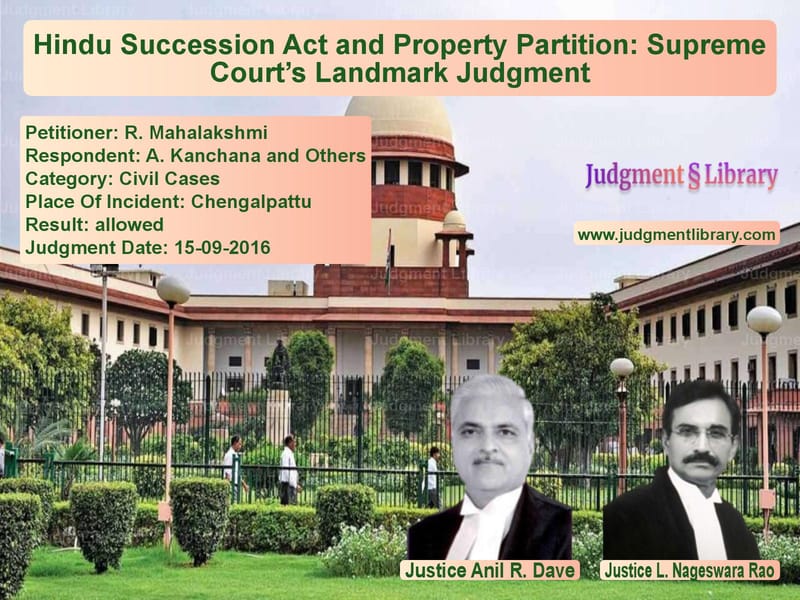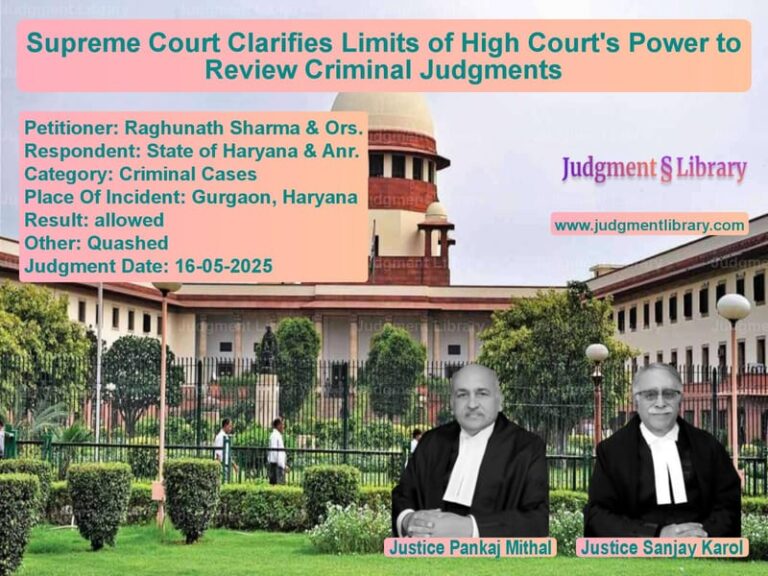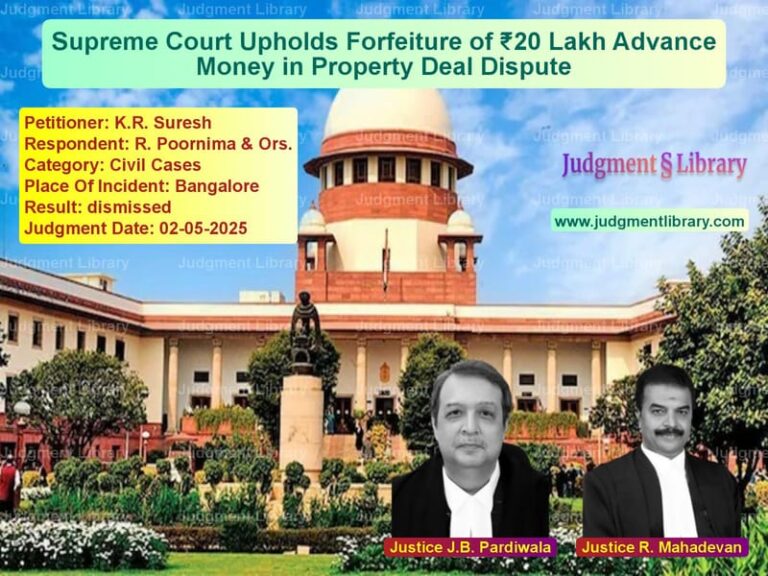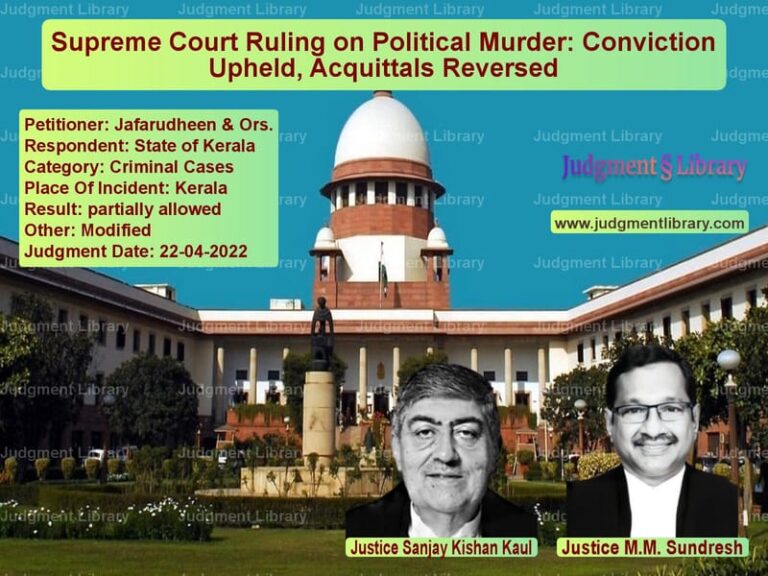Hindu Succession Act and Property Partition: Supreme Court’s Landmark Judgment
The Supreme Court of India recently ruled on a crucial property partition dispute under the Hindu Succession (Tamil Nadu Amendment) Act, 1989. This case, involving the inheritance rights of legal heirs, especially daughters, brought into focus the application of Section 29A of the Act, which granted daughters equal coparcenary rights.
Background of the Case
The dispute arose from a suit filed by Sri A. V. Venkataraman for partition and allotment of shares in an ancestral property inherited by his father through a registered partition deed dated April 27, 1954. Following his demise, his legal heirs, including the appellant and respondents, continued the litigation.
The case revolved around the distribution of property among the heirs and whether certain omitted properties should be included in the partition suit. The critical legal issue was whether daughters had equal rights as sons after the 1989 amendment.
Legal Proceedings and Initial Judgment
The Trial Court held that the plaintiff, the second defendant, and the fourth defendant were entitled to equal shares of 6/20 each, while the first and third defendants received 1/20 each. The appellant, however, challenged the ruling, claiming the suit omitted properties inherited by the deceased, making the partition incomplete and legally untenable.
Upon appeal, the Principal District Judge, Chengalpattu, upheld the Trial Court’s findings, rejecting the appellant’s argument.
Appeals and the Supreme Court’s First Intervention
The appellant took the case to the High Court, which also dismissed the appeal, reinforcing the decision of the lower courts. Dissatisfied, the appellant approached the Supreme Court in Civil Appeal No. 5053 of 2009.
In its 2009 judgment, the Supreme Court ruled in favor of the appellant, remanding the matter to the Trial Court. The Court held that all properties inherited under the 1954 partition deed were not accounted for, thereby validating the appellant’s argument of an incomplete partition.
Re-examination by the Trial Court
Following the Supreme Court’s order, the Additional Subordinate Judge, Chengalpattu, reconsidered the case and passed a preliminary decree on September 8, 2010. The court held that the appellant was entitled to 1/4 of the property, while the remaining 3/4 share went to the respondents.
However, this decision was again challenged in Appeal Suit No. 3 of 2011 and Appeal Suit No. 9 of 2013, leading to a ruling by the Principal District Judge that set aside the decree and remanded the matter once more to the Trial Court. The appellate court found that the lower court had not adequately complied with the Supreme Court’s earlier direction.
Further Legal Challenges in the High Court
The respondents filed multiple CMAs (Civil Miscellaneous Appeals) before the High Court of Madras, seeking to reinstate the previous rulings. The High Court overturned the decision of the appellate court and granted a preliminary decree declaring that the plaintiffs were entitled to a 5/8 share and the defendants to a 1/8 share each.
This High Court ruling prompted the appellant to file the present Civil Appeals before the Supreme Court.
Supreme Court’s Final Judgment
The Supreme Court, after hearing both parties, observed, “As we have held that the High Court misinterpreted the judgment of this Court in Civil Appeal No. 5053 of 2009, we set aside the judgment of the High Court and uphold the judgment of the First Appellate Court.”
The Court emphasized that the First Appellate Court correctly remanded the case to the Trial Court, directing it to reconsider all properties inherited under the 1954 partition deed.
The Court further noted, “The High Court committed an error in holding that there was no direction given by this Court for including the other properties in the suit schedule.” The Supreme Court clarified that the intent behind its earlier remand order was not merely procedural but substantive, requiring a comprehensive partition of all relevant properties.
Implications of the Judgment
This ruling has significant implications for property disputes involving Hindu succession laws. It reaffirms that:
- Daughters have equal rights as sons in ancestral properties under the Hindu Succession (Tamil Nadu Amendment) Act, 1989.
- A partition suit must account for all inherited properties; failure to do so makes the suit incomplete and legally unsound.
- Courts must strictly comply with Supreme Court directions, ensuring that remand orders are executed in both letter and spirit.
Conclusion
The Supreme Court’s decision in this case reinforces the principles of equity and fairness in property distribution. It upholds the legal doctrine that a partial partition suit is invalid and that all properties must be accounted for. The ruling also ensures that daughters’ inheritance rights are fully recognized, furthering gender equality in property laws.
The matter now returns to the Trial Court, which must consider the case afresh, strictly in compliance with the Supreme Court’s directives. This judgment serves as a precedent for similar cases, ensuring that property disputes are resolved with fairness and adherence to legal principles.
Don’t miss out on the full details! Download the complete judgment in PDF format below and gain valuable insights instantly!
Download Judgment: R. Mahalakshmi vs A. Kanchana and Othe Supreme Court of India Judgment Dated 15-09-2016-1741883770909.pdf
Direct Downlaod Judgment: Direct downlaod this Judgment
See all petitions in Property Disputes
See all petitions in Succession and Wills
See all petitions in Judgment by Anil R. Dave
See all petitions in Judgment by L. Nageswara Rao
See all petitions in allowed
See all petitions in supreme court of India judgments September 2016
See all petitions in 2016 judgments
See all posts in Civil Cases Category
See all allowed petitions in Civil Cases Category
See all Dismissed petitions in Civil Cases Category
See all partially allowed petitions in Civil Cases Category







